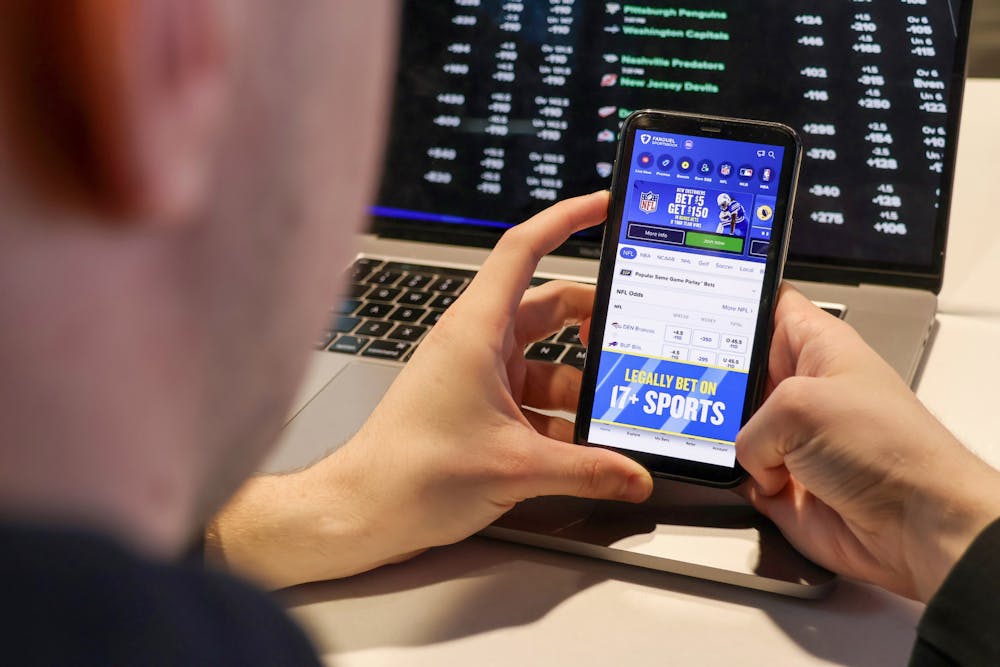Starting in March, sports wagering in North Carolina will be undergoing a historic transformation. After being signed into law in June 2023 by Gov. Roy Cooper, House Bill 347 will be put into effect on March 11, and online sports betting will be legal for those 21 and older in the state for the first time ever.
After almost 40 states legalized online sports betting, North Carolina has joined the rest of the country. Sport management professor David Bockino said he always expected for the state to eventually legalize sports betting.
“Seeing the success of how much money it’s bringing in for other states, I think we always knew that it was going to happen,” he said.
Senior Tim Houlahan is shocked that it took the state this long to legalize it.
“I think it’s kind of ridiculous that it’s taken so long for it to go in,” Houlahan said. “There’s plenty of other things that are more dangerous that are legal countrywide than this.”
However, according to professor of sport management Bill Squadron, the decision to wait on legalizing online sports betting was a smart one.
“The state acted very prudently. This is a very new area for the country as a whole, and it was wise to take their time and learn from what was happening in other states and to think carefully about the best rules and regulations and tax rates and other requirements to put in place,” Squadron said.
These regulations that the state is putting in place as a result of waiting and watching include an age limit, a cap on permitted sportsbooks in the state and a sports wagering tax.
Squadron believes that the decision to finally legalize it was partially motivated by the tax revenue they will receive.
“I think it’s going to generate significant amount of tax revenue that is all incremental and can be used for all kinds of things like infrastructure and health care and education and all kinds of very good and important needs for the state,” Squadron said.
HB347 states that there will be a sports wagering tax of 5.25% for bettors who generate a profit over a calendar year. The tax revenue that could result from this could bring in hundreds of millions of dollars for the state. According to Squadron, North Carolina’s neighboring states of Virginia and Tennessee have raised over a combined $350 million in additional state taxes from sports betting in the last three years.
Sports betting is not entirely new to North Carolina. The first retail sportsbooks were introduced at tribal casinos in 2021. But HB347 allows online and retail sports betting on non-tribal lands under the guidance of 12 permitted online sportsbooks. Operators such as FanDuel, DraftKings, BetMGM, ESPN BET, Fanatics, bet365 and Caesars Sportsbook are expected to be out in full force on March 11.
March 11 was not an entirely random choice. Online sports betting will be going live only a mere eight days before one of the biggest goldmines of sports betting: March Madness. Squadron expects the clever timing of the launch date to provide an immediate boom to business for betting operators.
“The state is a real sports loving state, particularly around college sports, and since it’s launching the day before the ACC men’s basketball tournament and a week before March Madness, which are two of the most popular events, I think that’ll propel a very strong launch,” he said.
A threat of gambling addictions could emerge from this influx in online sports betting. According to a review of 140 studies and reports conducted by The National Council on Problem Gambling, the rate of gambling problems among sports bettors is twice as high as gambling problems experienced by other gamblers.
Bockino, who is currently in the process of writing a book about the 150 year history of sports gambling, believes that Elon University and other college campuses are already facing an addiction crisis and that it will only be heightened by the legalization.
“I already think there’s sort of too much gambling on college campuses,” he said. “Until there’s a real effort to sort of prevent it, we’re gonna see the same issues that we’ve always seen with gambling addictions.”
This launch might be short lived, however. Following March Madness’ conclusion in early April, the two biggest sports for betting will be in the offseason. The absence of NFL football and college basketball could hurt the early success of HB347, according to Bockino.
“It’ll be a couple of weeks, couple of weekends, and then it’s just gonna be a lull for quite some time until football season kicks off,” Bockino said.
Houlahan is eager for the legalization of sports betting in North Carolina because of his previous experience with sports betting in his home state.
“I live in Virginia where it’s all legal. So coming down here and then realizing that it was all illegal, except for certain apps that are all based on props, it was a big adjustment. So I’m excited that it’s coming,” Houlahan said.
Bockino shared that sentiment, and said that it will provide relief for some of-age students who come back to campus and bet like they did at home.
For the people who already have gambling addictions, Bockino said he doesn’t think more access will increase their debt, because many people have found loopholes to gamble illegally prior to March 11, such as using a bookie from outside state lines to place bets.
Houlahan, who only makes one or two bets a day with around $20 on the line, feels that it’s all about setting limits.
“I think the biggest thing is just knowing anything can hurt you. Too much of anything is a terrible thing,” Houlahan said.


